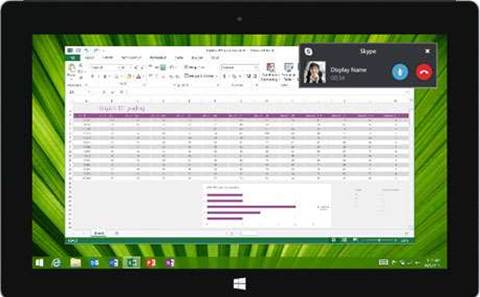Microsoft will replace the Lync name with Skype for Business as the company attempts to connect businesses with “hundreds of millions” of Skype users.
In a further example of Microsoft aligning its consumer and business branding, the next version of Lync will be called Skype for Business.
Scheduled to be released in the first half of 2015, Skype for Business will include a new client, server and updates to Office 365. Lync Server users will need to update from Lync Server 2013 to the Skype for Business Server, while Office 365 customers should receive the update automatically.
Microsoft is pitching the move as a way to combine the “familiar experience” of Skype with enterprise security of Lync.
While Skype for Business will be a separate client to Skype, it will incorporate key features of the consumer application.
For Lync users, this will mean the addition of video calling. Users will also be able to dial Skype users via the Skype directory. The interface adopts Skype icons and the call monitor used in Skype, which allows users to see an active call in a window when switching between applications.
Despite the interface change, administrators will retain the ability to control which interface is presented. Skype for Business will be compatible with previous versions of Lync.
Another change is the introduction of the SILK default codec from Skype, which Microsoft claims will result in better audio across devices.
In addition to enterprise grade security, Skype for Business will support two-factor authentication.
Mobile apps for iOS, Android and Windows Phone will be launched “nearer the time of general availability”.
The news was welcomed by Andrew Fullagar, product manager unified communications at Brisbane-based Lync specialist Comscentre.
“Lync user adoption is excellent, regardless of the complexities in the back end. So whether it’s called Lync or Skype for Business, is immaterial. If it continues to provide the flexibility and opportunity for cloud based revenue stream, it is a positive change,” Fullagar said via email.
“I think that the consolidation of Lync and Skype from a marketing and technical perspective is a long awaited positive change.”
“The only downside to the name change from Lync to Skype, is that Microsoft invested heavily in the “Lync 2010 and Lync 2013” marketing to change from Office Communicator. Customers finally understand and are adopting Lync. Now resellers, integrators and customers will need to rebrand the elevator pitch, and adapt quickly to this change. This was an inevitable change to the brand.“
Interest in Lync has attracted big names, with Modality setting up shop in Australia this year.





.jpg&h=142&w=230&c=1&s=1)







.jpg&w=100&c=1&s=0)











